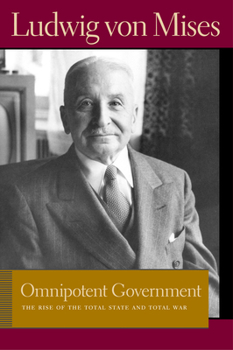Omnipotent Government: The Rise of the Total State and Total War
Select Format
Select Condition 
Book Overview
Published in 1944, during World War II, Omnipotent Government was Mises's first book written and published after he arrived in the United States. In this volume Mises provides in economic terms an explanation of the international conflicts that caused both world wars. Although written more than half a century ago, Mises's main theme still stands: government interference in the economy leads to conflicts and wars. According to Mises, the last and best hope for peace is liberalism--the philosophy of liberty, free markets, limited government, and democracy.
Ludwig von Mises (1881-1973) was the leading spokesman of the Austrian School of economics throughout most of the twentieth century.
Bettina Bien Greaves is a former resident scholar and trustee of the Foundation for Economic Education and was a senior staff member at FEE from 1951 to 1999.






